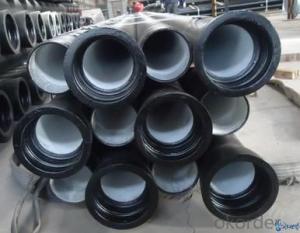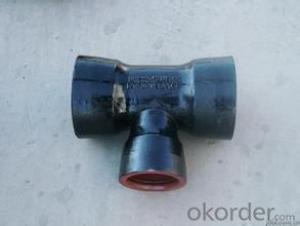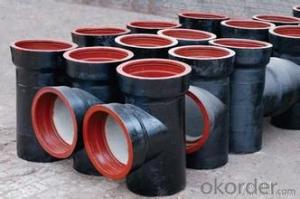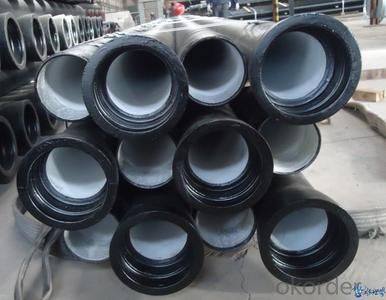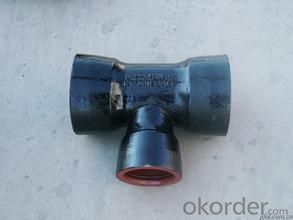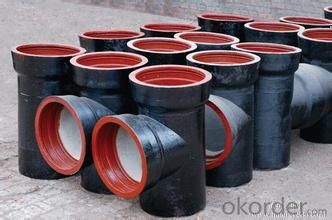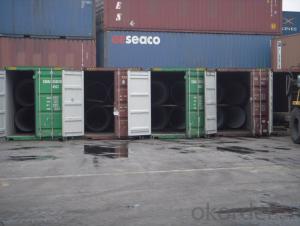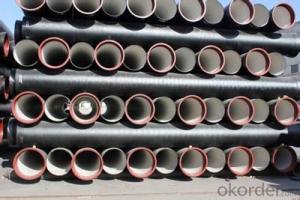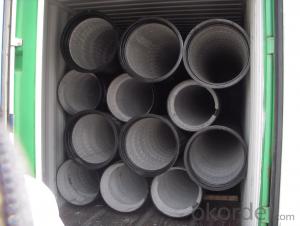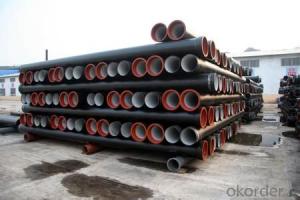DUCTILE IRON PIPE C Class DN500
- Loading Port:
- China Main Port
- Payment Terms:
- TT OR LC
- Min Order Qty:
- -
- Supply Capability:
- -
OKorder Service Pledge
OKorder Financial Service
You Might Also Like
Ductile Iron Cast Pipe is without any defects compare with tradition casting tech, which has many advantages particularly as follow:
(1) High density. In the "vertical upward casting" process, the melt iron of centre liquid column in center crystallizer is continuously feeding for volume shrinkage caused by condensation tube at outer circumference , which lead to be free of shrinkage porosity.
(2) High purity. When melt iron pouring, the mixed impurities such as gas, dross, sand grain which are lighter than melt iron could be eliminated at furnace mouth, its impossible to enter into the crystallizer through the channel, so the melt iron into the crystallizer is very pure.
(3) Strength with toughness. The cooling speed provided by continuous crystallizer is 30 times than sand casting and 5 times than centrifugal casting, and doesn't produce white iron, the eutectic cell volume of continuous cast iron is one eighth to one tenth compare with traditional cast iron. The density of graphite nodule in ductile iron can reach 300-700 pcs/mm2. Therefore, all reason above improve the strength and toughness of continuous cast iron.
(4) Free machining. The high speed cooling make the hardening phase (such as boride, steadite) not appear like reticular, massive or thick, but diffuse like fish bone and pane in shape, moreover, there are tiny graphite flakes inlaid hardening phase. It's free machining in BrinellHardness the range of 250-300HB. However, the Brinell Hardness of 250 is top limit to common metal materials.
(5) Uniform composition of tube wall. The convection mixing of liquid column caused by marching type drawing in crystallizer make the composition of tube wall well-distributed, and concentration gradient very little.
(6) High productivity. To the wall thickness of tube under 10mm, the speed of continuous casting is 1 meter/min, to the wall thickness of tube under 20mm, the speed of continuous casting is 0.5 meter/min, which is high efficiency that centrifugal or other casting tech couldn't reach.
- Q: What is the lifespan of ductile iron pipe?
- The lifespan of ductile iron pipe can vary depending on several factors such as the quality of the pipe, installation conditions, and maintenance practices. On average, ductile iron pipe can last for 50 to 100 years or more, making it a durable and long-lasting option for water and wastewater infrastructure.
- Q: Are ductile iron pipes suitable for use in acidic environments?
- Highly acidic environments are generally unsuitable for the use of ductile iron pipes. While ductile iron is recognized for its strength and durability, it does have limitations in acidic conditions. Over time, acidic environments tend to corrode and deteriorate ductile iron pipes. Corrosion occurs when the acid in the environment reacts with the iron in the pipe, eventually leading to pipe failure. The rate at which corrosion occurs depends on several factors, including the concentration and type of acid, temperature, and duration of exposure. Acidic environments with pH levels below 4 or 5 can significantly accelerate the corrosion process. To address this limitation, alternative materials such as stainless steel or corrosion-resistant alloys like PVC or HDPE pipes are often recommended for use in acidic environments. These materials exhibit superior resistance to corrosion and can withstand the harsh conditions associated with acidic environments. However, it is worth noting that ductile iron pipes may still be suitable for use in mildly acidic conditions or if protective measures are implemented to prevent corrosion. The application of protective coatings or linings to the pipes can help minimize the corrosive effects of acids. Consulting experts or engineers who are knowledgeable about the specific conditions and requirements of the project is crucial in determining the most appropriate material for use in acidic environments.
- Q: How does the white iron appear in the case of ductile iron?
- If it is to solve the white cast, the casting can be annealed.To prevent a chill in the casting, it is important to know your entire casting process to find the cause and the solution.
- Q: Can ductile iron pipe be used for nuclear power plants?
- Yes, ductile iron pipe can be used for certain applications in nuclear power plants. Ductile iron pipe is known for its strength, durability, and corrosion resistance, making it suitable for various industrial and infrastructure projects. However, when it comes to nuclear power plants, specific factors need to be considered. One of the primary concerns in a nuclear power plant is the safety and reliability of the materials used. While ductile iron pipe meets many requirements, it may not be the ideal choice for critical applications such as transporting radioactive fluids or handling high-pressure or high-temperature systems within the plant. These applications often require materials with exceptional resistance to corrosion, stress, and radiation damage. In nuclear power plants, other materials like stainless steel, nickel alloys, or even specialized materials like Inconel are commonly used due to their superior properties. These materials offer better resistance to radiation-induced embrittlement, corrosion, and high-temperature and high-pressure conditions. Therefore, while ductile iron pipe may have its uses in non-critical applications within nuclear power plants, it is important to consult industry experts, engineers, and comply with relevant nuclear safety regulations to determine the most appropriate materials for specific applications within the plant.
- Q: Ductile iron pipes lined with cement mortar in the water (living water, water in the 6.9-7.3) in the early pH, why pH increased? How to solve this problem?
- 1, because of the bone in mortar, such as silicate products, there will be silicification reaction, in addition, there is the reaction of limestone in lime.2, cement mortar lining cover coating, that is, spray some paint! Some questions four are unavoidable
- Q: What are the different lining materials available for ductile iron pipe?
- Some of the different lining materials available for ductile iron pipe include cement mortar lining, polyurethane lining, polyethylene lining, and epoxy lining. These linings help to protect the pipe from corrosion and extend its lifespan.
- Q: How do ductile iron pipes handle ground settlement due to construction activities?
- Ductile iron pipes have the ability to handle ground settlement caused by construction activities due to their flexibility and strength. These pipes are designed to withstand external pressure and can accommodate minor ground movements without significant damage or failure. The ductility of the material allows the pipes to deform slightly, absorbing the ground settlement and preventing them from cracking or breaking. Additionally, the joints in ductile iron pipes are typically flexible, allowing for further movement and reducing the risk of leakage or structural issues. Overall, ductile iron pipes are well-suited for withstanding ground settlement and ensuring the integrity of the pipeline system during construction activities.
- Q: Can ductile iron pipes be used for underground hydropower systems?
- Indeed, underground hydropower systems can utilize ductile iron pipes. Renowned for their robustness and endurance, ductile iron pipes are apt for a wide range of purposes, including subterranean installations. With remarkable resistance against corrosion and the ability to withstand intense pressure, they are exceptionally suited for transporting water in hydropower systems. Furthermore, ductile iron pipes boast a lengthy lifespan, diminishing the necessity for frequent replacements and reducing maintenance expenses. Moreover, they exhibit excellent joint integrity, guaranteeing leak-free connections beneath the surface. Thus, ductile iron pipes emerge as a dependable option for underground hydropower systems.
- Q: Can ductile iron pipes be used for dam construction?
- Yes, ductile iron pipes can be used for dam construction. Ductile iron pipes are known for their strength, durability, and corrosion resistance, making them suitable for a wide range of applications, including dam construction. These pipes can withstand high pressure, making them ideal for transferring water or other fluids within the dam structure. Additionally, their ability to withstand external loads and ground movement makes them a reliable choice for the construction of dams. Ductile iron pipes are also relatively easy to install and maintain, further adding to their suitability for dam construction projects.
- Q: Are ductile iron pipes resistant to frost heave?
- Yes, ductile iron pipes are generally resistant to frost heave due to their strong and flexible nature.
Send your message to us
DUCTILE IRON PIPE C Class DN500
- Loading Port:
- China Main Port
- Payment Terms:
- TT OR LC
- Min Order Qty:
- -
- Supply Capability:
- -
OKorder Service Pledge
OKorder Financial Service
Similar products
Hot products
Hot Searches
Related keywords
